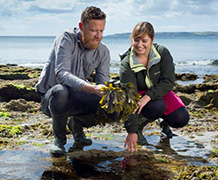
Dr Michiel Vos and Abi Colclough
Scientists in Cornwall turn to seaweeds in search for new drugs
Pioneering research in Cornwall is hoping to discover new ways of searching for antibiotics – from the seaweeds found along the county’s coastline.
In a project that could change the way we develop new drugs, researchers from the University of Exeter Medical School have been collecting and analysing seaweeds gathered from rock pools and beaches across Cornwall.
They’re trying to uncover properties that could form the basis for a new generation of antibiotics and stop the growing threat of resistant superbugs, such as MRSA.
As the number of multidrug-resistant bacteria rises there is an urgent need for new drugs that can be used to treat infections when others fail. Natural environments can be a rich source of antibiotics, but developing natural compounds into new antibiotics is a complicated and costly process. This study will help to design cost-effective processes for screening and testing natural products.
Dr Michiel Vos, an expert in microbial evolution, is leading the research and believes the team’s early findings have been very promising “We’re using insights from ecology and evolutionary biology to help in the search for new drugs and our early experiments have confirmed that seaweeds hold a diverse array of antimicrobial properties. Excitingly, some of these extracts are most effective against some of the more resistant and problematic bacteria and we’re hoping our work will help to make the discovery of new drugs quicker and cheaper.”
The project has also enabled BSc Medical Sciences student, Abi Colclough, to spend her 3rd year placement working on research that could have global implications.
Based at the University of Exeter’s Penryn Campus, Abi’s year-long placement has given her invaluable time in the laboratory. She said: “Spending a year in a research lab has been the single best decision I’ve made during my BSc. I used to hate the idea of working in a lab and definitely couldn’t see myself where I am now. Science is full of highs and lows and doing a lab project has taught me how to learn from mistakes and problems. Labs can move at an incredible pace and I’ve taken so much in over a year, learning loads of techniques and even dabbling in a bit of chemistry.”
The study has been so promising the team is currently trying to secure funding for a PhD position to extend the research, Dr Vos explained: “With Abi’s help we’ve started to gain an understanding of how to focus our search for new antimicrobial compounds in nature. To take these ideas further we’d like to create a dedicated research project that can really shed light on the potential we’re seeing. With its rich abundance of coastline and seaweed species, Cornwall is the perfect place for this kind of research.
This work has been based at the European Centre for Environment & Human Health. You can keep up to date with the latest projects in their labs by following Dr Vos’s blog.
Date: 27 August 2015
